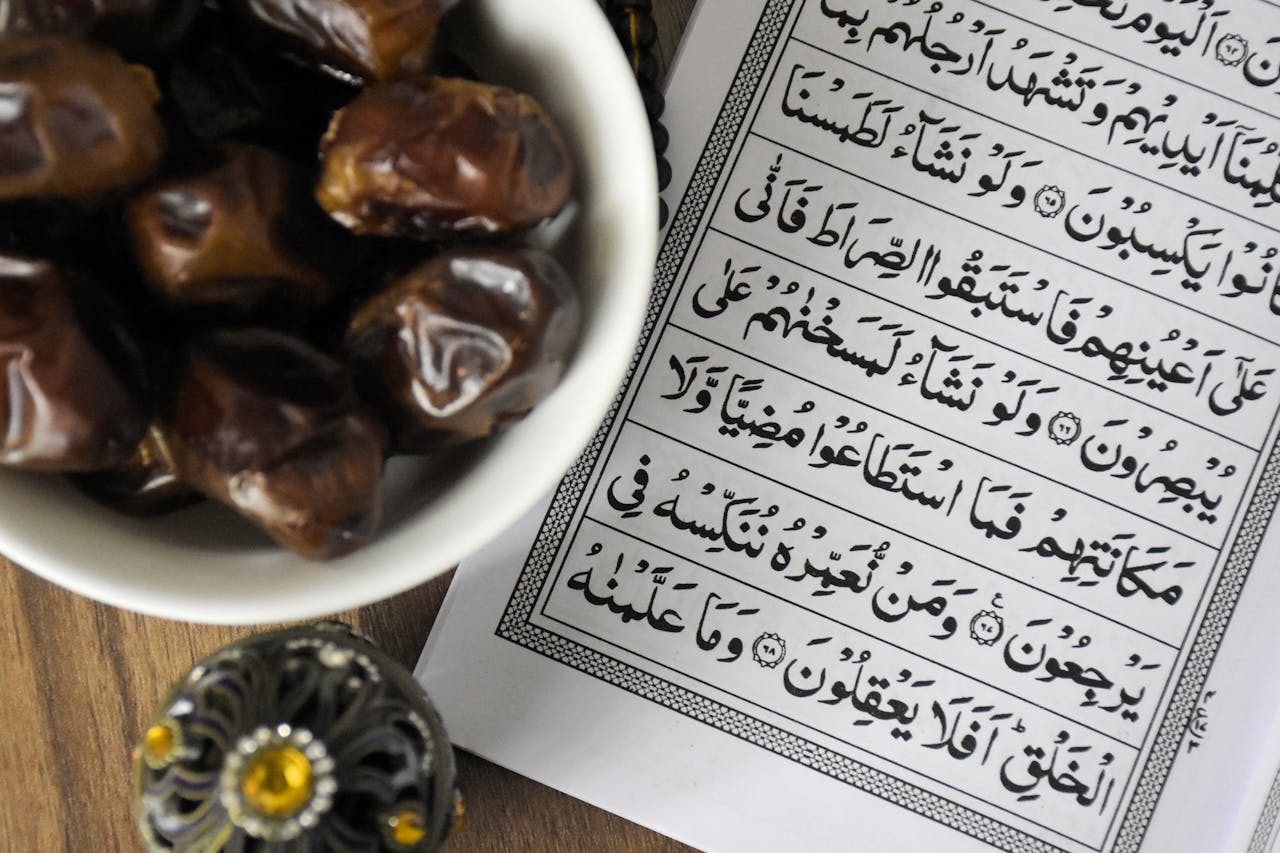The primary goal of fasting (also known as Sawm) is to achieve Taqwa, or God-fearing, and to always live according to Islamic ideals. During Ramadan, Muslims do not eat or drink (fast) from sunrise to sunset.
Here, you will learn about the dua for fasting and the importance of the act for Muslims.
Duas for Fasting in Ramadan

The essence of fasting and the close relationship between a believer and their Creator are captured in the dua for fasting. It encompasses the spiritual journey of Ramadan and acts as a confession of faith, thankfulness, and dependence on Allah (SWT).
This dua captures the essence of fasting as a spiritual journey and is a reminder of faith, thankfulness, and dependence on Allah (SWT).
Dua for opening fast in Ramadan
Arabic: وَبِصَوْمِ غَدٍ نَّوَيْتَ مِنْ شَهْرِ رَمَضَا
English Transliteration: Wa bisawmi ghadinn nawaiytu min shahri ramadan.
English Translation: I intend to keep the fast for tomorrow in the month of Ramadan.
Here is another dua for opening your fast in Ramadhan.
Arabic: نـَوَيْتُ صَوْمَ غـَدٍ عَـنْ ا َدَاءِ فـَرْضِ شـَهْرِ رَمـَضَانَ هـَذِهِ السَّـنـَةِ لِلـّهِ تـَعَالىَ
English Transliteration: Nawaitu sauma ghadin anadai fardu syahri ramadhana hadzihissanati lillahitaala.
English Translation: I intend to do an obligatory fast tomorrow in the month of Ramadan this year because of Allah (SWT).
Dua for breaking fast in Ramadan
Arabic: اللَّهُمَّ لَكَ صُمْتُ وَعَلَى رِزْقِكَ أَفْطَرْتُ
English Transliteration: Allah umma laka sumtu wa ‘ala rizqika aftartu
English Translation: O Allah, for You I have fasted, and by Your provision, I have broken the fast
Dua For Breaking Fast With A Group Of People
Arabic: أفطر عندكم الصائمون ، وأكل طعامكم الأبرار ، وصلت عليكم الملائكة
English Transliteration: aftara indakum as-saa’imoon, wa akala ta’aamakum al-abraar, wa sallat alaikum al-malaa’ikah
English Translation: May the fasting people break fast at your place, and may the pious eat from your food, and may the angels pray for you.
Correct intentions when fasting
According to Umar Ibn Al-Khattab, he overheard the divine messenger صلى الله عليه و سلم say:
The above is a very deep Hadith of the Prophet (PBUH) that captures the essence of all actions in Islam.
Fasting during Ramadan is an example of an act of worship, but it is only acceptable if it is done with the correct intention.
The ability to intend or desire is called niyyah, and it comes from the heart rather than the lips. A person can discern the type of action (e.g., mandatory fasting, voluntary fasting, make-up fasting, etc.) and its intention (e.g., fasting for social prestige or fasting to appease Allah (SWT) and propagate His faith) by niyyah.
Prophet Muhammad (PBUH) declared that
Why is fasting important?
Fasting is a highly spiritual discipline with physical, mental, and emotional benefits. Fasting is meant to help us cultivate the virtue of righteousness (taqwa), both inside and externally, by teaching us to restrain our thoughts and cravings and refrain from committing sinful acts.
Fasting assists us in caring for the amanah (trust) that Allah (SWT) has given us in our bodies.
The following are some advantages of regular fasting for physical health:
- Keeps you safe from chronic obesity-related ailments.
- Improves cardiac health.
- Lessens insulin resistance, which helps to regulate blood sugar.
- Improves cognitive function, lowers inflammation, and may aid in preventing neurodegenerative diseases.
Fasting is Sunnah and has numerous health benefits during Ramadan and throughout the year.
Islam holds that self-control and self-discipline are fundamental qualities, and fasting fosters these qualities. Muslims develop their inner strength and ability to resist temptation by abstaining from food, drink, and other luxuries during the day.
Self-control is not just about not eating; it’s also about not engaging in undesirable behaviours like gossiping, getting angry, or lying, and it involves teaching self-control. People quickly develop a more conscious knowledge of their behaviour and work to align it with Islamic principles.
Furthermore, fasting fosters a strong sense of gratitude for Allah’s (SWT) gifts. Hunger and thirst make us more conscious of the things we frequently take for granted, such as having access to food, clean water, and a place to live.
Fasting serves as a reminder of the difficulties and tribulations faced by the less fortunate and serves as a call to share our blessings with those less fortunate.
Verses from The Holy Quran about Fasting
The following verses from the Quran emphasize the significance and benefits of fasting during Ramadan.
Hadiths regarding fasting
Prophet Muhammad (PBUH) also emphasized fasting during Ramadhan and other months.
The prophet ((PBUH) ) said, “(Allah said),
Dua for fasting on Monday and Thursday
Fasting on Mondays and Thursdays has special significance. Abu Qataadah al-Ansaari narrated that the Messenger of Allah (PBUH) was asked about fasting on Mondays. He said:
Additionally, Abu Hurayrah (may Allah be pleased with him) that the Messenger of Allah (peace and blessings of Allah be upon him) said:
Dua for fasting on white days
Every lunar month, on the 13th, 14th, and 15th, the Messenger of Allah (saw) would fast. In Arabic, these days are known as Al-Ayyam al-Bid, meaning “the white days.” They are also referred to as “the bright days,” “the shining nights,” and “the bright nights.”
Al-Malik ibn Qudamah ibn Milhan (ra) is credited with narrating that his father (RA) said,
The benefits of fasting during the full moon are great. The Messenger of Allah (PBUH) said:
Here is a dua for fasting on white days.
Arabic: نَوَيتُ صَومَ أَيَّامِ البِيض سُنَّةً لله تَعَالَى
English Transliteration: Nawaytu Sauma Ayyamil Bidh Sunnatan Lillahi Taa’la
English Translation: I intend to observe the Sunnah fast of the White days for Allah the Most High
What days are forbidden for fasting?
Fasting is forbidden on certain days of the year. Umar (RA) stated:
Muslims should also not fast during the three days after eid al adha, also known as the days of Tashreeq. The Messenger of Allah (PBUH) had sent Abdullah ibn Hudhafah (RA) to Mina to announce that:
Fasting exclusively on Friday is also not recommended, as prophet Muhammad (PBUH) stated,
Muslims are also discouraged from fasting one or two days before Ramadhan. Abu Hurairah reported that the Messenger of Allah said:
Fasting in Rajab
According to Islamic belief, the night of Al Isra wal Miraj, or the 27th of Rajab, is when the revered Prophet Muhammad (PBUH) is said to have started the renowned Shab-e-Meraj, or night of ascension.
The prophet Muhammad (PBUH) underwent a miraculous nighttime voyage and ascension when he went from Makkah to Jerusalem’s Masjid Al-Aqsa and ascended to heaven. The night trip from Makka to Masjid Al-Aqsa is called “Isra.” The voyage to the sky from Masjid Al-Aqsa is known as Mi’raj.
That was when the five required daily prayers were first given to the Prophet (PBUH). He led them in prayer and met some of the other Prophets. During this tour, the Prophet (PBUH) saw many amazing things.
It was also a chance for the genuine Believers to shine and a test of faith for the believers at the time.
The prophet Muhammad (PBUH) was experiencing great suffering and grief during the historical period of the night journey and ascension. He had recently lost several of his closest friends and family members and had also been cruelly rejected by the Ta’if people. It is said to have happened a year before the Hijrah, or the journey from Makkah to Madinah.
This miracle, bestowed to the Prophet (PBUH) by Allah (SWT), profoundly affected both Islam and the prophet’s (PBUH) life.
Anas (r.a) reported that the messenger ﷺ use to make this dua at the beginning of Rajab,
Fasting in Shaban
Fasting in the month of Shaban has amazing benefits. It is the month when Allah (SWT) elevates the acts of his slaves, and the Prophet (PBUH) used to spend a significant portion of it fasting.
Aisha (RA) stated,
Can you brush your teeth while fasting?
Most Muslim experts agree that brushing your teeth throughout Ramadan is acceptable. Cleaning teeth when fasting will not invalidate your fast.
However, other scholars advise against using toothpaste during fasting if you ingest it accidentally.
Summary – Dua For Fasting
Fasting for the sake of Allah alone is a special act of devotion for which there is a unique reward. Since it is one of the five pillars of Islam, it must be observed during Ramadan. On the other hand, Muslims can observe the sawm at any time of year to worship or make up for missed fasts.
A dua made during a fast shows devotion to Allah (SWT), steadfast confidence and trust in Him, and appreciation for all the nourishment He gives us. One must consciously choose to fast for Allah’s (SWT) sake. We can better set our intentions for the fast by saying the dua for fasting.






